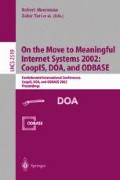Abstract
The design of virtual workplaces that can support virtual work processes has traditionally been either ad-hoc, or has been influenced by the top-down approaches, such as ‘virtual architecture’ and requirements identification and analysis. There are several problems with the top-down approaches. We still lack knowledge about how people collaborate in distributed computer-mediated information environments, hence, the requirements in the top-down approach are usually derived from the expectation of how the business process will run in a face-to-face environment. Another problem with existing groupware support for such environments is the difficulty in obtaining, and subsequently retaining and reusing, ready-made configurations of collaborative work processes. Such configurations naturally occur during the actual use of collaborative system when conducting projects. These configurations reflect the actual dynamics of the process, adapting the environment to support emerging work processes. Can we learn more about the actual collaboration in a virtual environment (rather than the one derived from the face-to-face expectations)? Can we reuse this knowledge for better support of computer-mediated collaborative projects? Can we predict some elements of the evolution of a new collaborative process, based on similarities and analogies with processes formalised and supported before? Can we predict possible emergent processes and cater for them? Can we capture and utilise the evolutionary component in the workspace design process, so that we can provide better support to the developers of collaborative workspaces? The paper presents the latest developments of a new approach for supporting the design and redesign of collaborative virtual workplaces, based on combining data mining techniques for refining lower level models with a reverse engineering cycle to create upper level models. The methodology utilises an apriori knowledge about the data models in the systems and a visual language for formal process representation.
Access this chapter
Tax calculation will be finalised at checkout
Purchases are for personal use only
Preview
Unable to display preview. Download preview PDF.
References
P. Anders, Envisioning cyberspace: Designing 3-D electronic spaces. New York: McGraw-Hill, 1999.
R. P. Biuk-Aghai, “Virtual Workspaces for Web-Based Emergent Processes,” in Fourth Pacific Asia Conference on Information Systems: Electronic Commerce and Web-Based Information Systems. Hong Kong, China, 2000, pp. 864–880.
R. P. Biuk-Aghai, “Visualization of Web-Based Workspace Structures,” in Proceedings of the 1st International Conference on Web Information Systems Engineering, vol. 1, Q. Li, Z. M. Ozsoyoglu, R. Wagner, Y. Kambayashi, and Y. Zhang, Eds. Hong Kong, China: IEEE Computer Society, 2000, pp. 302–309.
R. P. Biuk-Aghai and S. J. Simoff, “An Integrative Framework for Knowledge Extraction in Collaborative Virtual Environments,” in Proceedings of the ACM 2001 International Conference on Supporting Group Work. Boulder, CO, USA: ACM Press, 2001.
T. L. Fanderclai, “MUDs in education: new environments, new pedagogies,” Computer Mediated Communication Magazine, vol. 2, 1995.
U. M. Fayyad, G. Piatetsky-Shapiro, and P. Smyth, “From data mining to knowledge discovery: An overview,” in Advances in Knowledge Discovery and Data Mining, U. M. Fayyad, G. Piatetsky-Shapiro, P. Smyth, and R. Uthurusamy, Eds. Menlo Park, CA, USA: AAAI Press/MIT Press, 1996.
I. T. Hawryszkiewycz, “Workspace Networks for Knowledge Sharing,” in Proceedings of AusWeb99, the Fifth Australian World Wide Web Conference, R. Debrency and A. Ellis, Eds. Ballina, Australia, 1999, pp. 219–227.
I. T. Hawryszkiewycz, “Analysis for Cooperative Business Processes,” in Proceedings of the Fifth Australian Workshop on Requirements Engineering, D. Zowghi, Ed. Brisbane, Australia, 2000, pp. 3–11.
M. L. Maher, S. Simoff, N. Gu, and K. H. Lau, “Two Approaches to a Virtual Design Office,” International Journal of Design Computing, vol. 2, 2000.
C. Moorman and A. S. Miner, “Organizational Improvisation and Organizational Memory,” Academy of Management Review, vol. 23, pp. 698–723, 1998.
D. Patching, Practical Soft Systems Analysis. London: Pitman, 1990.
D. Richards and S. J. Simoff, “Design ontology in context-A situated cognition approach to conceptual modeling,” AI in Engineering, vol. 15, 2001.
S. Simoff and M. L. Maher, “Designing with the activity/space ontology,” in Artificial Intelligence in Design 98, J. S. Gero and F. Sudweeks, Eds. Dordrecht: Kluwer Academic, 1998, pp. 23–44.
S J. Simoff and M. L. Maher, “Loosely-integrated open virtual environments as places,” IEEE Learning Technology, vol. 3, 2001.
Author information
Authors and Affiliations
Editor information
Editors and Affiliations
Rights and permissions
Copyright information
© 2002 Springer-Verlag Berlin Heidelberg
About this paper
Cite this paper
Simoff, S.J., Biuk-Aghai, R.P. (2002). Discovering Emergent Virtual Work Processes in Collaborative Systems. In: Meersman, R., Tari, Z. (eds) On the Move to Meaningful Internet Systems 2002: CoopIS, DOA, and ODBASE. OTM 2002. Lecture Notes in Computer Science, vol 2519. Springer, Berlin, Heidelberg. https://doi.org/10.1007/3-540-36124-3_17
Download citation
DOI: https://doi.org/10.1007/3-540-36124-3_17
Published:
Publisher Name: Springer, Berlin, Heidelberg
Print ISBN: 978-3-540-00106-5
Online ISBN: 978-3-540-36124-4
eBook Packages: Springer Book Archive

